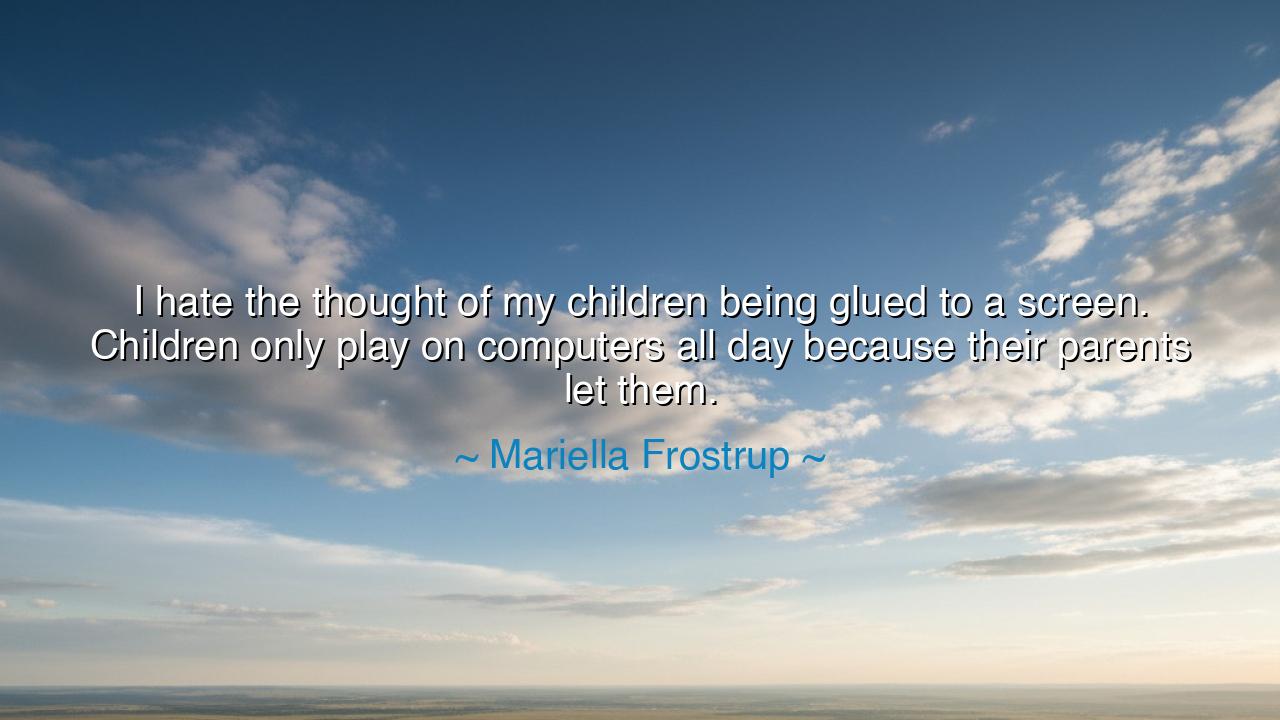
I hate the thought of my children being glued to a screen.
I hate the thought of my children being glued to a screen. Children only play on computers all day because their parents let them.






In an age where the flicker of the screen has become the new hearth around which families gather, Mariella Frostrup, with the wisdom of both mother and thinker, spoke words of warning and of love: “I hate the thought of my children being glued to a screen. Children only play on computers all day because their parents let them.” These are not the words of disdain for technology, but of lament for lost balance, for the fading art of presence in a world consumed by pixels. Beneath her statement lies a truth as ancient as parenting itself — that the child’s world is shaped not by chance, but by example, and that where attention flows, the heart follows.
The origin of this quote is found in the early years of the twenty-first century, when society first began to feel the weight of its digital dependence. Frostrup, a journalist, broadcaster, and advocate for thoughtful living, observed with a keen and motherly eye the transformation of childhood. The laughter once born of fields and imagination had been replaced by the hollow glow of screens. Children no longer ran with the wind — they scrolled, they clicked, they stared. And yet, she understood that this was not the child’s fault. It was the result of a generation of adults — parents, weary and distracted — who had surrendered their guardianship to convenience. Her words are both rebuke and reminder: that the duty of shaping young souls cannot be outsourced to machines.
When she says, “Children only play on computers all day because their parents let them,” she strikes at the very root of modern complacency. It is a call to responsibility, to awaken from the easy comfort of distraction and reclaim the sacred role of guidance. For though the tools of our time are wondrous, they are also perilous — capable of feeding curiosity or devouring it entirely. Frostrup’s wisdom reminds us that freedom without boundaries is not liberty, but chaos; and that a child, left without guidance, will drift not toward growth, but toward the path of least resistance — the endless, numbing world of screens.
History itself offers echoes of this struggle between innovation and moderation. In the days of ancient Rome, the philosopher Seneca warned that the citizens of his empire were becoming enslaved to entertainment — gladiatorial games that dulled their minds and hardened their hearts. He wrote, “The crowd does not care to think; it only desires to feel.” And so, Rome’s youth grew restless and shallow, their vigor consumed by spectacle. In our time, the gladiator’s arena has returned, not in stone amphitheaters, but on screens — endless streams of noise and motion that captivate the young while leaving their spirits unfed. Frostrup’s words, like Seneca’s, cry out across the centuries: teach the young to think, not merely to consume.
Yet her message is not born of despair, but of hope. The mother’s heart in her sees not condemnation, but possibility. She knows that the child is not corrupted by the machine, but merely lost within it, waiting to be led back to the living world — the world of books, of play, of touch, of wonder. The screen itself is not evil; it is only a mirror of the choices we make. When we, as adults, choose the glow of devices over the glow of faces, when we replace stories told by voice with videos played by code, we teach our children what to value. And so, Frostrup’s plea is not to abandon technology, but to reclaim our humanity within it.
Let us imagine, for a moment, a simple scene: a family gathered not around a tablet, but a table. Conversation flows, laughter rises, and eyes meet. The world outside — trees, rain, the hum of life — begins to enter the child’s imagination again. It is not a fantasy; it is the fruit of intention. Frostrup’s wisdom tells us that such moments will not happen by accident — they must be chosen. The parent must become once more the shepherd of attention, guiding the child toward what nourishes rather than what numbs. For it is not technology that steals time — it is inattention.
So, O listener, take these words as both comfort and command. If you are a parent, a teacher, a guardian of young hearts, remember that every moment given to a child is a seed planted in eternity. Teach them that the world beyond the screen still sings — that books have scent, that wind has voice, that laughter shared face-to-face carries warmth no circuit can hold. Guard their wonder as the ancients guarded their fires. Do not let the screen raise them; raise them yourself.
The lesson of Mariella Frostrup’s words is one of sacred responsibility. A child’s heart is a mirror — it reflects what it is shown. If we offer them only devices, they will learn detachment; if we offer them our time, they will learn love. The future, then, depends not on the power of machines, but on the wisdom of those who use them. To lead a child away from the glow of the screen is not to deny progress, but to guide it — to remind the next generation that while light may come from devices, life still comes from the heart.






AAdministratorAdministrator
Welcome, honored guests. Please leave a comment, we will respond soon